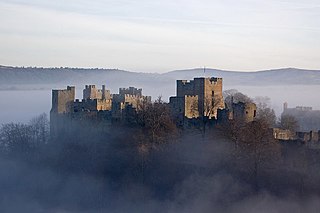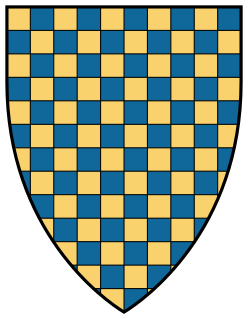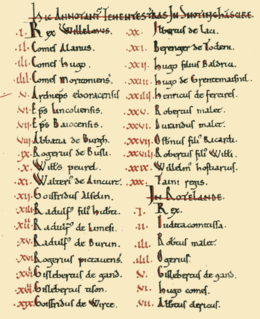Related Research Articles
Roger Bigod was a Norman knight who travelled to England in the Norman Conquest. He held great power in East Anglia, and five of his descendants were earls of Norfolk. He was also known as Roger Bigot, appearing as such as a witness to the Charter of Liberties of Henry I of England.
Gilbert Fitz Richard, 2nd feudal baron of Clare in Suffolk, and styled "de Tonbridge", was a powerful Anglo-Norman baron who was granted the Lordship of Cardigan, in Wales c. 1107–1111.
Robert Fitz Richard (1064–1136) was an Anglo-Norman feudal baron of Little Dunmow, Essex and constable of Baynard's Castle in the City of London. His feudal barony, the caput of which was at Little Dunmow in Essex, was granted to him by the king after it had been forfeited in 1110 by William Baynard, whose grandfather Ralph Baynard was the first holder and the builder of Baynard's Castle in the City of London.

William d'Aubigny or D'Aubeney or d'Albini, Lord of Belvoir was a prominent member of the baronial rebellions against King John of England.

William de Chesney was an Anglo-Norman magnate during the reign of King Stephen of England and King Henry II of England. Chesney was part of a large family; one of his brothers became Bishop of Lincoln and another Abbot of Evesham Abbey. Stephen may have named him Sheriff of Oxfordshire. Besides his administrative offices, Chesney controlled a number of royal castles, and served Stephen during some of the king's English military campaigns. Chesney's heir was his niece, Matilda, who married Henry fitzGerold.

Robert Despenser was a Norman officeholder and landholder in post-Conquest medieval England.

Pain fitzJohn was an Anglo-Norman nobleman and administrator, one of King Henry I of England's "new men", who owed their positions and wealth to the king.
Brian fitz Count was descended from the Breton ducal house, and became an Anglo-Norman noble, holding the lordships of Wallingford and Abergavenny. He was a loyal adherent of Henry I, King of England, and a staunch supporter of his daughter, the Empress Matilda, during the Anarchy (1135–1153).
William de Chesney was a medieval Anglo-Norman nobleman and sheriff. The son of a landholder in Norfolk, William inherited after the death of his two elder brothers. He was the founder of Sibton Abbey, as well as a benefactor of other monasteries in England. In 1157, Chesney acquired the honour of Blythburgh, and was sheriff of Norfolk and Suffolk during the 1150s and 1160s. On Chesney's death in 1174, he left three unmarried daughters as his heirs.
Reginald de Warenne was an Anglo-Norman nobleman and royal official. The third son of an earl, Reginald began his career as an administrator of his brother's estates, and continued to manage them for his brother's successor, William, the second son of King Stephen. Reginald was involved in the process that led to the peaceful ascension of Henry fitzEmpress to the throne of England in 1154 and served the new king as a royal justice afterwards. He played a minor role in the Becket controversy in 1170, as a member of the party that met Becket on his return to England from exile in 1170.
Nigel d'Aubigny was a Norman knight, and supporter of William I of England. His name is frequently mentioned in the Domesday Book of 1086 in connection with lands in what is now Bedfordshire. He almost certainly built and lived in Cainhoe Castle, a small motte-and-bailey structure to the east of Ampthill.
Hugh de Cressy was an Anglo-Norman administrator and nobleman. Little is known of his ancestry and he first served two brothers of King Henry II of England before becoming a royal official. He was rewarded with a marriage to an heiress for his service to the king. In England he often served as a royal justice and witnessed documents, which showed his closeness to the king. On the continent, he recruited mercenaries for the royal army and was named constable of the castle of Rouen in the royal lands in France. He died in 1189 after giving lands to various monasteries before his death.
William Meschin was an Anglo-Norman nobleman and baron. The brother of the earl of Chester, Meschin participated in the First Crusade. After returning to England, he acquired lands both from King Henry I of England and by his marriage to an heiress.
Walter de Clare or Walter fitzRichard was an Anglo-Norman nobleman and founder of Tintern Abbey. A member of a powerful family, Walter was a younger son who was given lands around Chepstow Castle by King Henry I of England sometime before 1119. Walter continued to appear in Henry's charters for the rest of the reign, and was an early supporter of King Stephen of England, Henry's successor as king. Walter last appears in the historical record in 1136 and died without children. His lands went to his nephew.
Ralph fitzStephen was an English nobleman and royal official.
Rohese Giffard was a Norman noblewoman in the late 11th and early 12th century. The daughter of a Norman noble, she was the wife of another Norman noble, Richard fitzGilbert, who was one of the ten wealthiest landholders there after the Norman Conquest. Rohese is mentioned in Domesday Book as a landholder in her own right, something uncommon for women. She and Richard had a number of children, and she lived on past his death around 1086, until at least 1113 when she is recorded giving lands to a monastery. Her descendants eventually inherited her father's lands, although this did not occur until the reign of King Richard I of England.
Fulk Paynel was an Anglo-Norman nobleman and landowner.

The de Warenne family were a noble family in England that included the first Earls of Surrey, created by William the Conqueror in 1088 for William de Warenne, 1st Earl of Surrey, who was among his companions at the Battle of Hastings. The family originated in Normandy and as Earls, held land there and throughout England. When the senior male-line ended in the mid-12th century, the descendants of their heiress adopted the Warenne surname and continue as Earls of Surrey for another two centuries. Several junior lines also held land or prominent offices in England and Normandy.
Richard fitzUrse was an Anglo-Norman nobleman and feudal baron of Bulwick in Northamptonshire.

The Domesday Book of 1086 AD lists King William the Conqueror's tenants-in-chief in Snotinghscire (Nottinghamshire), following the Norman Conquest of England:
References
- K. S. B. Keats-Rohan, 'Aubigné, William d' (d. in or after 1148)', Oxford Dictionary of National Biography, Oxford University Press, 2004. doi : 10.1093.